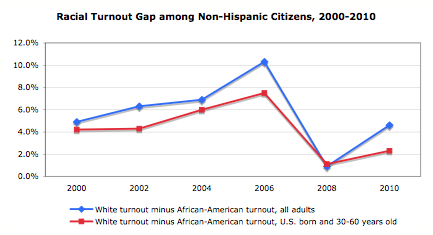Critical Consciousness Motivates Voting Among Poor and Working Class Youth
Matthew A. Diemer and Cheng-Hsien Li of Michigan State University have completed a new study, forthcoming in Child Development, that finds low-income youth are more apt to vote if they are engaged in political activism and influenced by friends and family. The research was funded by the National Academy of Education and a Spencer Foundation Read More >
A Closer Look at African-American Turnout

African-American turnout was remarkably high in 2008, and that fact received considerable attention. The turnout of African-Americans in 2010 was notably lower, and African-American turnout declined more than white turnout did between 2008 and 2010. According to the Census Current Population Survey, African-American* citizens over the age of 18 were 4.6 percentage points less likely Read More >
FEATURED: Schoolwide Civic Intervention May Help to Increase Community Service Participation Among Students of All Backgrounds

By Hugh McIntosh, Sheldon Berman, and James Youniss March 2010 “CIRCLE Working Paper #70” describes a five-year evaluation of a high school program designed to encourage schoolwide democratic deliberation. The intervention involved, in part, organizing the school into clusters of 100 to 150 students that met for one hour each week to discuss governance and Read More >
Working Paper 25: Civic Views of Young Adult Minorities: Exploring the Influences of Kinship Communities and Youth Mentoring Communities on Prosocial Civic Behaviors

by Diann Cameron Kelly December 2004 “However, for many minority youth, being engaged with society is a more comprehensive, cultural issue than merely voting, joining mainstream member organizations or volunteering through traditional service groups (Flanagan, Bowes, Jonsson, Csapo, & Sheblanova, 1998; Schlozman, Verba & Brady, 1999; Torney-Purta, et al., 2003; Yates & Youniss, 1998; Watts, Read More >
Working Paper 14: The Relationship between Secondary Education and Civic Development: Results from Two Field Experiments with Inner City Minorities

by John Anthony Philiips May 2004 “This study is additionally novel in the measures it uses to gauge civic engagement. Many scholars have characterized minority students as possessing less political knowledge and participating less in civic organizations than their white counterparts (Hodgkinson and Weitzman 1997, Niemi and Junn 1998, Lake et al. 2002). These findings Read More >




